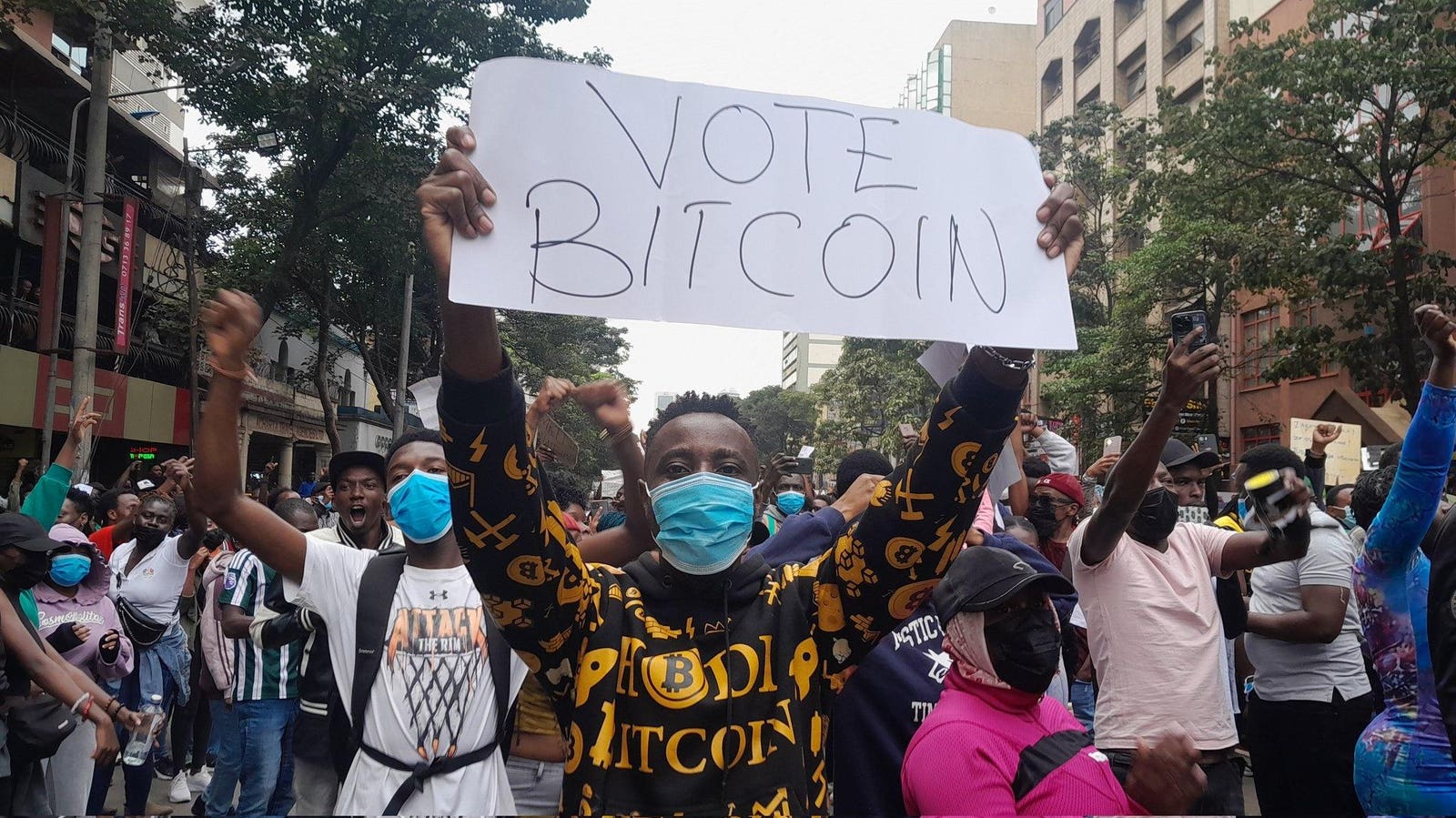Kenyan Bitcoiner protesting the controversial Finance Bill 2024
Felix Mukungu
On Tuesday, June 25, thousands took to the streets of Nairobi, the capital of Kenya, in a youth-led protest against the controversial finance bill recently passed by the Kenyan Parliament.
What started as a demonstration of the legitimate grievances of Kenyans against the planned widespread tax increases introduced by the bill soon saw Kenya Defence Forces (KDF) called in after President Ruto’s address to the nation on needing to restore “normalcy” amid what he characterized as “violence and anarchy” resulted in over 300 injured and at least 20 killed from police-involved shootings, according to Amnesty International’s Kenya section.
Amid the chaos, Bitcoin
Bitcoin
awareness among the youth has also been burgeoning. As Kenyan Bitcoiner and Machankura team member Noelyne Sumba put it, “Bitcoin’s decentralized nature provides a level of financial freedom that is becoming increasingly attractive to Kenya’s youth.”
Kenyan Bitcoiner showing Bitcoin poster amid Kenyan youth-led protest against controversial finance … [+] bill 2024
Felix Mukungu
Kenya’s Controversial Finance Bill 2024
Presently, Kenya’s public debt is 68% of its GDP, which is above the IMF and World Bank’s 55% recommendation. As part of a set of reforms and strategies targeted at aligning with fiscal reforms agreed on with the IMF in 2021 to significantly reduce Kenya’s dependency on borrowing, the Kenyan government has been raising tax rates and levies. The most ambitious attempt was formalized in the now infamous Finance Bill 2024/25.
The bill, first proposed in May of this year, aimed to raise around $2.3 billion in revenue to help cover the country’s budget deficit. Additionally, beyond reducing the budget deficit by increasing revenue collection, the bill aimed to cut down on government spending.
Further, the bill introduced numerous proposed taxes from a 1.5% digital on local online platforms whose services include jobs, rentals, food delivery, and ride-hailing (though subject to parliamentary approval), a value-added tax (VAT) on electric bikes, buses, and solar and lithium-ion batteries, to a 16% VAT on ordinary bread, transportation of sugar cane, financial services and foreign exchange transactions.
On June 13, Kenyan youth began organizing on social media to make their voices heard under the #RejectFinanceBill2024 hashtag, initially on TikTok and then X (the platform formerly known as Twitter). The push was to get the parliament to vote No on the bill but was seen as ineffective, and the strategy soon switched to taking to the streets in a planned peaceful protest on June 18.
According to Noelyne, following her interview with Bitcoin Magazine, “Passing the Finance Bill will likely reduce the already low standard of living for Kenya’s 56 million citizens. This bill perpetuates a trend of leveraging the future of the country’s youth due to excessive borrowing by an unaccountable government. This continuous borrowing has led to a debt-to-GDP ratio of 67% as of 2023, which will continue to significantly impact economic stability and growth.”
Besides the tax rates introduced in the bill, there are larger precedents this bill would introduce; as Noelyne highlights, “The government is threatening privacy and data security by proposing that the Kenya Revenue Authority (KRA) access personal data without consent.” Adding that “This move could potentially lead to tyrannical government profiling and misuse of private information.”
The Protests and Kenyan Parliament Bill Passage
Following the largely peaceful protest on June 18, Kenyan police arrested over 230 protesters, who were subsequently released after youth-led pressure on social media. On June 19, the budgetary committee of the Kenyan parliament decided to strike down some of the controversial amendments of the bill, like the 16% VAT on bread. Yet, many Kenyans saw this as not enough.
On June 20, the bill passed the second reading in the Kenyan parliament with a 204-115 vote, further igniting the protest that had started earlier in anticipation of the vote. The protests reached their boiling point on June 20 when protesters breached the Kenyan parliament building, with further escalations coming after part of the building was lit on fire, including heavy gunfire from the police in an attempt to control the crowd. On June 26, according to the Kenyan Medical Association, over 13 people had been killed the previous day.
Despite these reports and the country-wide Internet outage experienced earlier today, the protesters were unshaken by this and continued to make their voices heard.
These efforts did eventually pay off, as earlier today at 7 PM Kenyan local time, President Ruto acknowledged the people’s voice in an address, stating he will not sign the Finance Bill 2024, as the people have spoken.
Bitcoin as a Hope For Kenya and Its Youth
As Noelyne highlighted when asked about what the youth believe is Bitcoin’s role in all this, “Many young Kenyans see Bitcoin as a way to escape the restrictive monetary policies imposed by international financial institutions, which have contributed to the country’s economic challenges.”, Adding that “Integrating Bitcoin into the financial system could reduce reliance on foreign debt and offer a way out from oppressive government policies that hinder economic and individual growth.”
It is important to point out that Bitcoin offers economic freedom to both individuals and nation-states. To this end, many African bitcoiners believe that African countries can only escape decades of entrenched economic bondage by realizing this and taking Bitcoin more seriously.
With Kenya already making strides on renewables energy development via bitcoin mining, it is only a matter of time before governments across Africa realize that Bitcoin can significantly alleviate many of its economic and infrastructural challenges and is a more viable alternative to their current approaches.
This article was originally published by a www.forbes.com . Read the Original article here. .

